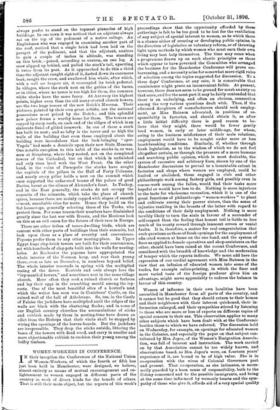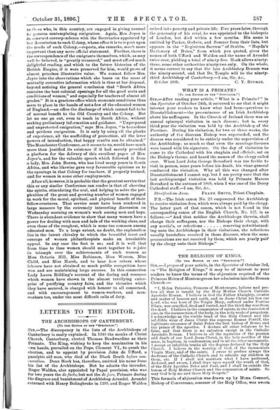WOMEN-WORKERS IN CONFERENCE.
IN their inception the Conferences of the National Union of Women-Workers, of which the fourth or fifth has just been held in Manchester, were designed, we believe, almost entirely as means of mutual encouragement and en- lightenment to women engaged in different parts of the country in wcrk of divers kinds for the benefit of others. That is still their main object, but the reports of this week's proceedings show that the opportunity afforded by these gatherings is felt to be too good to b,e lost for the ventilation of any subject of special interest to women, as to which there is a chance either of creating or developing public opinion in the direction of legislative or voluntary reform, or of throwing light upon methods by which women who must earn their own Living may best help themselves. The time may come when a programme drawn up on such elastic principles as those which appear to have governed the Committee who arranged, the business for the Manchester Conference will prove em- barrassing, and a necessity arise for somewhat more rigid rules of selection among the topics suggested for discussion. To a three days' Conference, at any rate, it is conceivable that omniscience might prove an inconvenient foible. At present, however, there does not seem to be ground for meal' anxiety on that score, and for the most part it may be fairly contended that there is an underlying, and often an obvious, connection among the very various questions dealt with. Thus, if the educated daughters of manufacturers should seek employ- ment, as Miss Bateson advocated, in positions of re- sponsibility in factories, and should obtain it, as after a little initial difficulty there is good reason to be- lieve that they might, there would be fewer gently bred women, in early or later middle-age, for whom, owing to the business misfortunes of their male relations, employment would have to be sought under more or less heart-breaking conditions. Similarly, if, whether through fresh legislation, as to the wisdom of which we do not feel altogether certain, or through the pressure of a more humane and searching public opinion, which is most desirable, the system of excessive and arbitrary fines, shown by one of the Manchester discussions to prevail to a lamentable extent in factories and shops where women are employed, could be limited or abolished, those engaged in club and other philanthropic work among factory girls, and possibly even in rescue-work among the fallen, would find their tasks more hopeful or would have less to do. Nothing is more injurious to the taste for wholesome recreation, which it is one of the great functions of philanthropic " women-workers " to plant and cultivate among their poorer sisters, than the sense of injustice rankling in the breasts of the latter with regard to. the conditions of their daily employment. Nothing is more terribly likely to turn the scale in favour of a surrender of self-respect than the feeling that honest toil is liable to lose much of its scanty reward through innocent errors or venial faults. It is, therefore, a matter for real congratulation that such questions as those of fresh openings for the employment of educated women at home on the one hand, and the system of fines as applied to female operatives and shop-assistants on the. other, should have been raised at the recent Conference, and considered with the breadth of knowledge and the moderation of temper which the reports indicate. We must add here the expression of our cordial agreement with Miss Bateson in the view that an infusion of educated women into some of the trades, for example calico-printing, in which the finer and more varied taste of the foreign producer gives him an advantage, might serve appreciably to redress the balance in favour of this country.
Women of influence in their own localities have been assembled in Manchester from all parts of the country, and it cannot but be good that they should return to their homes and their neighbours with their interest quickened, their in- formation enlarged, and their sympathies stirred by listening to those who are more or less of experts on different topics of special concern to their sex. This observation applies to many other subjects which have been dealt with at the Conference besides those to which we have referred. The discussion held on Wednesday, for example, on openings for educated women in the Colonies, and especially the paper on that subject con- tributed by Mrs. Joyce, of the Women's Emigration Associa- tion, was full of interest and instruction. The work earned on by that Association cannot be too widely known, and observations based, as Mrs. Joyce's were, on fourteen years' experience of it, are bound to be of high value. She is in co-operation with the wives of Colonial Governors past and present. That co-operation, as she intimates, is neces- sarily guarded by a keen sense of responsibility, both to the Colony concerned and to the possible immigrants, and being at the same time influenced by womanly hearts and the sym- pathy of those who give it, affords aid of every special quality to those who, in this country, are engaged in giving counsel to persons contemplating emigration. Again, Mrs. Joyce is in constant correspondence with the Secretaries appointed by ter Association to each Colony, whose office it is to report upon the needs of such Colony,—reports, she remarks, much more important than any mere official statement. Further, there is the correspondence of the emigrants themselves, which, as may well be believed, is "greatly treasured," and must afford much delightful reading, and which to the future historian of the British Empire, if it were preserved for him, would prove of almost priceless illustrative value. We cannot follow Mrs. -Joyce into the observations which she bases on the mass of mutually corrective information which is thus at her disposal, beyond noticing the general conclusion that "South Africa .contains the best colonial openings for all the good sorts and conditions of women," and especially for teachers of almost all grades." It is a gracious office which economic conditions thus -seem to place in the hands of not afew of the educated women of England,—an office the discharge of which cannot fail to be -of mutual benefit to the Old Country and the Colony. But let no one go out, even to teach in South Africa, without -seeking preliminary information and guidance. "Unprepared .and unprotected emigration," says Mrs. Joyce, "is hazardous and perilous emigration. It is only by using all the planks of experience, all the scaffolding of protection, all the lever powers of introduction, that happy results can be obtained." The Manchester Conference, as it seems to us, would have much snore than justified its existence if it had merely provided
platform for the delivery of this excellent paper of Mrs. Joyce's, and for the valuable speech which followed it from -a lady, Mrs. John Brown, who has lived many years in South Africa, and who likewise gave very favourable opinions as to the openings in that Colony for teachers, if properly trained, and for women in some other employments.
After all, however, it is probable that the greatest service that this or any similar Conference can render is that of cheering the spirits, stimulating the zeal, and helping to solve the per- plexities of the great and growing number of women engaged in work for the moral, spiritual, and physical benefit of their fellow-creatures. That service must have been rendered in large measure by the extremely interesting discussion on Wednesday morning on women's work among men and boys. There is abundant evidence to show that many women have a power for dealing with men and lade of the working class, and -even those of the roughest, which is none too common among -educated men. To a large extent, no doubt., the explanation lies in the latent chivalry to which the beautiful trust and courage of women philanthropists make an irresistible appeal. In any case the fact is so; and it is well that from time to time women should meet together to rejoice in triumph over the achievements of such women as Miss Octavia Hill, Miss Robinson, Miss Weston, Miss Child, and Miss Marsh, and to hear how others whose labours have not obtained so much public recognition have won and are maintaining large success. In this connection Lady Laura Ridding's account of the daring and resource which women have shown in the almost terrifying enter- prise of purifying country fairs, and the victories which they have secured, is charged with honour to all concerned, and with encouragement to women-workers, and men- workers too, under the most difficult calla of duty.











































 Previous page
Previous page